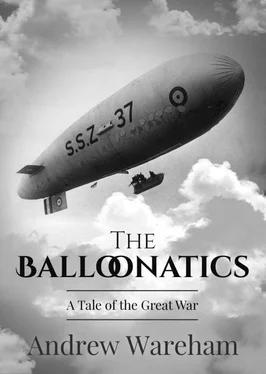“Will that not make them upset with you, Father?”
“Very likely, Peter. They can then think of what they might be able to do to me, and what I could do to them if it came to outright conflict. Government needs me, just at the moment. Not me alone, the City as a whole. We are financing their war for them and finding foreign exchange to buy munitions from the States.”
“I thought America was neutral, sir.”
“Much of America thinks the same. The reality is that American business will sell to the highest bidder, irrespective of the purchaser’s location. Germany cannot transport American goods across the Atlantic; the country has too few ships and we have too many cruisers out on blockade. The Americans therefore sell to us and it is up to us then to bring the goods across the ocean. Nine times out of ten, we can do it. German purchasers have tried to work out of Mexico and ship from Caribbean ports aboard neutrals. To our knowledge, not one of those cargo ships has yet got through.”
“So, neutrality means that the Americans treat both sides equally, but we are the only ones who can actually buy from them.”
“Just that, Peter. As well, inevitably, some American firms will extend us credit so that we can continue to buy from them. They will not be repaid if Germany wins.”
“By trading with America, they are forced to favour us. Eventually, they will join the war, will they not?”
“They will have to if they are to protect their own economic interests.”
“What if they were to refuse to trade with either party, Father?”
“They would not make their present high rate of profits.”
All became clear.
“Their President Wilson tries to take the moral high ground, does he not?”
“He does – a most honest gentleman, one who seeks the best for his country. He has not a chance in Hell of prevailing – those who seek profits for themselves overrule him every time.”
“To what extent does that reality prevail here, Father?”
“Not at all, Peter!” Geoffrey was irate that the very suggestion might be made. “We all in the City act for the true good of the country!”
Mr Naseby gave a short bark of laughter.
“There are none so blind, Geoffrey! You refuse to see what is happening around you. Indeed, you will not acknowledge what you are doing yourself. Those New Jersey contracts we completed last month are to provide the War Office with a steady flow of the chemicals it needs for its shell factories; they also bring us three per cent per annum, indefinitely.”
“A fee for making the most complex arrangements, Father! Avoiding the neutrality regulations was a difficult task.”
“If all goes as expected, they will put a million into our pockets over the next five years, Geoffrey. That is a very substantial fee for our services.”
“We shall pay tax upon the sums, Father. A great deal of that income will go to the Exchequer.”
“No it won’t, Geoffrey. The payments will be made into our branch in Port Royal, Jamaica, opened for that purpose. From there, they will be transferred to our Jersey accounts. None of that money will pass through the taxman’s hands.”
Geoffrey, who had turned a careful blind eye to anything that smacked of tax evasion, showed embarrassed.
“It’s for the benefit of the family, Father. We cannot be expected to impoverish ourselves just so incompetent politicians can engage in warfare.”
“Perhaps not, my son. One can argue for the greater good – we have enabled the country to make war by overcoming much of the shortage in munitions. A minor tax arrangement on the side is not to be cavilled at.”
It meant little to Peter. Tax was for the wealthy, not for naval officers.
He slept early and long, idled for two days, submitted to the examination of the family doctor, an expert on measles and childbirth, no doubt, lacking experience in bullet wounds, however. He satisfied Peter’s mother that all was well, which was his main function.
“A walk in the fresh air would do you good, Peter.”
“It might well, Mama.”
“A stroll around the local shops, perhaps?”
He acquiesced, suspecting that the main function was to display him, a wounded hero son.
“Uniform or civilian clothes, Mother?”
“Better in uniform, Peter. There are a few of young widows and more of bereaved mothers who will not like to see a young man in civilian dress. Geoffrey avoids the town when he can, I know. He is embarrassed not to be seen in uniform. Also, to give him his due, he wishes to fight for the right.”
Mrs Naseby had never felt quite the affection for her elder son that she did for the younger. Geoffrey had been inflexible even as a very small boy, unwilling to engage with her without a knowledge that he would receive a fair exchange. She hoped he might fall in love one day, rather doubted he would permit himself any untrammelled outpouring of emotion; she thought he did not have it in him to give unreservedly.
“Best he should never join up, Mama. He is not the most flexible of sorts. He would seek a commission in the Guards and be out in the Trenches in a very few weeks. I cannot imagine he would live too long there.”
“No. He is not one to duck his head down. That would not be proper.”
“Exactly. Could he be sent across the ocean, perhaps? A permanent representative of the bank in New York?”
“I shall speak to your father. It might well be possible. I know he is worried for Geoffrey.”
They said no more on the topic, wandering the half mile into the town centre and greeting other matrons seemingly at a loose end. A number of middle-aged females with daughters in their train took pains to come near and be introduced to Peter. Most managed to gush foolishly on the topic of sinking a submarine one month and wounded in the next.
“Yes, ma’am. I am on my way to winning the war single handed.”
That seemed to be the most exquisite of jokes. Their equally dim daughters laughed merrily with their mamas.
Peter’s mother was unsympathetic to his complaints.
“You are known to be unwed, Peter. It would be remiss in them not to display their daughters to you.”
“That final female, the enormous one, had only the one girl and her no more than fourteen, surely!”
“Mrs Jenkinson, widow to a quarter of a million, I believe, held safely in trust to descend to her girl. You might bear her in mind for the peace, Peter. Never too young to be displayed. In any case, she was a pretty little girl, growing up to be most attractive.”
“Not to my taste, Mama! What if she grew up to emulate her mother?”
Mrs Naseby admitted that to be a daunting prospect.
“Always as well to know the family before becoming close to the young lady, Peter. What of your Miss Hawes-Parker?”
A different matter, she discovered.
“She will not know that I have been wounded, Mama. As well, she knows that when the weather is favourable I will be flying dawn to dusk. She will not look to see me on her doorstep except on a rainy day – and not all of them. She is, I think, a sensible young lady as well as most attractive. I shall marry her, if she will take me.”
“We must arrange to meet her, Peter. I do not doubt that I shall love her as a daughter!”
He laughed – it was good of her to say so, despite the qualms she must have.
“Oh, my Lord, Peter! Across the street. It is that terrible Lancing girl! The eldest.”
“Who, Charlie? Good fun and bright as well, Mama. Not really the material to make a wife, I must agree.”
Charlie closed on them at a run.
“Peter! Wounded? So dashing in a sling, do not you think, Mrs Naseby?”
Mrs Naseby did not.
“Fell out of your old balloon, Peter?”
Читать дальше












